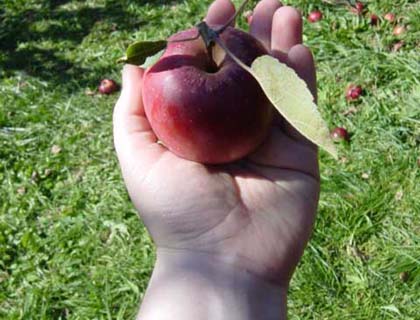A rabbi tells the story of how he was sent to the afterworld. He first went to hell and opened the door. Upon opening the door he saw many people sitting at a table with people seated directly across from one another. On the table was an endless feast of food, but no one was eating. He took a closer look and noticed that even though everyone had utensils to eat, they also had wooden planks tied to their arms at their elbows so they couldn’t bend their arms. The rabbi sat and watched as each person tried to get a spoonful of food to their mouths, but to no avail. Everyone looked like they were emaciated.
The rabbi then went to the door to Heaven and opened it. As he walked in, he noticed the same set up. There were a bunch of people sitting at a table with people seated directly across from each other. As with hell there was also an endless feast of food. What the rabbi noticed was that people were talking with each other and laughing. As he got closer, he noticed something else. Each person also had wooden planks tied to their arms, so that their arms would not bend. But what he also noticed was that each person would use their utensil to get a spoonful of food and then feed the person directly across from them. That person would say thank you, and then do the same for the person who just fed them.
Excited by what he saw, the rabbi went back to hell to tell everyone the good news. He ran into the room and whispered in one the people’s ear, “If you feed the person across from you, they can return the favor.” The person shocked and disgusted replied angrily, “You want me to feed that wretched person?!! I’d rather starve.” Upon that, the rabbi realized that was the difference between Heaven and hell.
Psychologically, reciprocity means that in response to friendly actions, people are frequently much nicer and much more cooperative than predicted by the self-interest model. However, in response to hostile actions they are frequently much nastier and even brutal. Reciprocity is so strong that a person will feel obligated to return a favor regardless of whether they like the person who originally gave the favor and even if they did not want the favor. The recipient feels indebted to the favor or benefit giver until he/she repays. There is a principle said, “I’ll scratch your back if you scratch mine”. A pattern of frequent giving and receiving of help among workers boost both productivity and social standing.
In the friendship context, reciprocation means to give or take mutually but not necessarily equally. Overall reciprocal balance is more important than strict equality at every moment. Friendship based on reciprocity means caring for each other, being responsive and supportive and in tune with each other. But without some form of overall reciprocal balance, the relationship may become transformed into a nonreciprocal form of friendship, or the friendship may fail altogether.
We all know what this feels like. It’s innate to all human beings to feel a strong sense to reciprocate with someone who made us feel a certain way with an action that will make them feel the same. If they treat us well, we want to do the same. If they treat us bad, we feel like dishing something negative back at them.
When I do someone a favor, my goal is not to deliver it with the message “you owe me one.” A favor in return does happen sometimes; but it is a byproduct. If a favor in return does come my way, great. But if that doesn’t happen, or I’m not sure it is likely to happen, I don’t think that should stop me from doing a good deed.
Though it might look great on the outside, if my heart is not in the right place, people can say. If my motivation for helping someone else is really just about helping myself, over time, that “good deed” will not be so “good” after all. If that was my motivation, I essentially used the deed to extract favors from others. I think we all know the difference between wanting to return a favor and feeling obligated to. The obligation doesn’t feel so good.
After all, whatever a man or woman sows he or she will reap. That is a law of nature, and it is the law of God.
How are we to behave toward one another? Morality is a social phenomenon. Think about this. If a person is alone on some deserted island would anything that person did be moral or immoral? That person may do things that increase or decrease the chance for survival or rescue but would those acts be moral or immoral? Most of what we are concerned with in Ethics is related to the situation in which humans are living with others. Humans are social animals. Society contributes to making humans what they are. For humans there rises the question of how are humans to behave toward one another.
Many believe that one will meet the result of his action and reaps what s/he sows either in this world or in the hereafter. Since the world is like a mountain, which reflects our sound, we have to say good things and act well so as to receive the same thing. We should try to live according to golden rule which says, “One should treat others as one would like others to treat oneself.”

